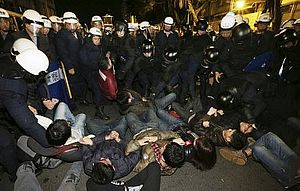When China abstained from the UN resolution on Crimea’s future on March 15, it surely had Taiwan and other territorial claims in mind. China has long voted with Russia in the UN Security Council. Knowing China’s long-cherished stance on sovereignty, the emergency vote was drafted in a way that emphasized territorial integrity and non-interference in the internal affairs of other countries. Thank Taiwan for its success. Deemed by Beijing as a sacrosanct part of its sovereign integrity, Taiwan falls within China’s “core interests” formula. Why does Taiwan matter so much to China? Because Taiwan is on the frontlines of Beijing’s efforts to challenge the existing regional, if not global, order.
Perhaps it is not surprising, then, that Chinese President Xi Jinping told Taiwan’s envoy at the APEC Summit in Bali in October 2013 that political discussions could not be postponed indefinitely. Or that China’s negotiator conveyed to his Taiwanese counterpart at a meeting in Nanjing on February 11 that the Trade in Service Agreement (TiSA) the two sides signed last June must pass parliament and come into effect sooner rather than later.
On March 17, the agreement did clear Taiwan’s Legislative Yuan, or parliament, in which President Ma Ying-jeou’s ruling KMT commands a majority (mocked by critics for its meek compliance). The next day, dozens of student activists broke into parliament demanding due process regarding the TISA. The protest has since gathered momentum, with hundreds of thousands surrounding government buildings.
Governance under Ma
Before the TiSA with China was signed in June 2013, there had been no debate in Taiwan’s parliament and no consultation of stakeholders. Despite warnings issued by leading academics from various fields late last year about the likely overwhelming impacts on Taiwan’s society, Ma’s government has insisted that without the implementation of TiSA, the island’s economy would suffer. Yet even a government-commissioned assessment shows that TiSA would raise GDP by only 0.03 percent.
According to leading academics, the agreement would lift existing restrictions on Chinese investment in Taiwan’s service industries in an almost wholesale manner, with lower thresholds applied on the capital required in relation to the number of Chinese nationals allowed to work in Taiwan, as well as in terms of the level of skills/expertise of Chinese nationals been granted a visa, compared with the immigration laws of most other countries.
One flaw cited is unfair competition. Most of Taiwan’s service-sector firms are SMEs, which would need to compete with China’s state-owned enterprises (which still dominate Chinese economic output) operating in the form of chain stores or franchises, or would face price wars with smaller private Chinese companies. Since the service sector accounts for around 70 percent of Taiwan’s economic output, the majority of Taiwanese citizens would be affected. And given Beijing’s stated political aims, security experts suggest that intelligence agents could use Chinese companies as legal cover.
Another concern involves national security, because the agreement encompasses sectors such as telecommunication, logistics, and transportation, involving many basic infrastructure projects. Even Taiwan’s National Security Bureau Director Tsai Der-sheng admitted the security risks of deepening exchanges.
In addition, figures from Taiwan’s publishing and journalism industry, and academics in arts departments, have expressed fears that Chinese authorities would intrude on Taiwan’s press freedom, once Chinese capital begins to dominate Taiwan’s publishing, printing, entertainment, media and cultural industries.
An Inconvenient Truth
One rule in trade negotiations that Ma Ying-jeou should bear in mind is that external economic liberalization should entail as large a group of trading partners as possible. That is especially true for a small economy, which wants to avoid being bullied by a more powerful country. Moreover, remarks made by China’s Foreign Minister Wang Yi, who was Taiwan Affairs Office (TAO) chief before being taking his current position, on September 20, 2013 in a speech at Brookings, in which he predicted that “Gradual integration of the two sides (of Taiwan Strait) through two-way interactions and cooperation will lead to ultimate reunification” again made clear Beijing’s motivation.
Given China’s ADIZ, as well as its assertiveness in the East and South China Seas, the world should be paying attention to Beijing’s approach to Taiwan. What Crimea is to Russia, Taiwan is to China.
The unilateral decision-making process regarding an agreement with China by Ma’s government invokes the memory of former Ukrainian President Viktor Yanukovych’s arbitrary acts, before protesters gathered in the Maidan. The current social movement in Taiwan demanding the democratic pillar of due process is an effort to prevent what appears to be an impending loss of democracy. Countries that profess to respect democratic values should perhaps begin to heed the ongoing student movement in Taiwan and position themselves on the right side of history.
Ching-yi Huang is a Taipei-based writer.

































